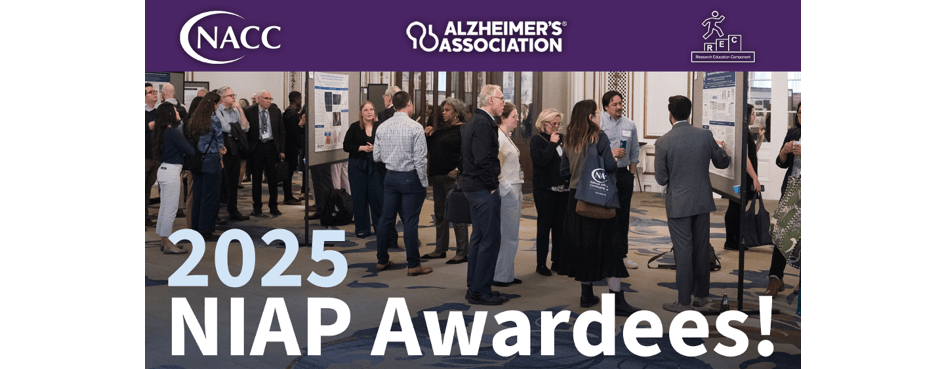2025 New Investigator Award Winners

The National Alzheimer's Coordinating Center (NACC) congratulates the winners of the 2025 New Investigator Awards, each of whom will receive $135,000 in direct costs to support their research, thanks to funding from the Alzheimer's Association® (22 awards) and NACC (one award). The awards help early-career scientists conducting innovative research at the National Institute on Aging-funded Alzheimer's Disease Research Centers (ADRCs) across the United States.
This year's highly competitive process drew 138 eligible proposals from early-career investigators at 34 of the 36 ADRCs. Through a partnership with the ADRC Programs' Research Education Component, applicants had the opportunity to participate in a mentorship program, with 82% of applicants requesting and being matched with mentors. The program's effectiveness was clear, with 93% of mentees expressing confidence they could apply this guidance to future grant applications, demonstrating lasting career development benefits. The winning researchers' projects address a broad range of important questions in Alzheimer's disease and related dementias, spanning early diagnosis and disease progression monitoring, molecular disease mechanisms, and the effects of stress and socioeconomic factors on dementia risk.
The 2025 winners are:
Oluwaseun Adeyemi, MD, PhD
New York University ADRC
Role of Social Determinant of Health on AD/ADRD Health Outcomes
Oluwaseun Adeyemi, MD, PhD, at the New York University ADRC, is examining how social determinants of health (SDoH) influence outcomes for people living with AD/ADRD. Although SDoH are known to affect many health conditions, their impact on AD/ADRD remains underexplored. Dr. Adeyemi's project will use county-level data to identify hotspots of AD/ADRD prevalence and mortality, while also analyzing individual-level data to determine how SDoH contribute to dementia severity, depression, psychosocial burden, falls, and death. By combining geospatial mapping with patient-level analyses, this work aims to guide public health strategies, optimize resource allocation, and uncover modifiable factors that can improve outcomes for individuals and communities affected by AD/ADRD.
David Braun, PhD
University of Kentucky ADRC
Modulation of Neuronal Function in AD: The Role of Astrocyte p38 MAPK
Advances in biomarker detection have unlocked opportunities for early detection and treatment of AD, as highlighted by the two new anti-amyloid immunotherapies approved by the FDA. These treatments indicate cognitive preservation depends upon severing the link between initial amyloid accumulation and later involvement of tau. Evidence indicates that aberrant astrocyte activation is a critical link in this causal chain and is accessible to non-invasive biomarker detection. Research suggests that the stress kinase p38α - a regulator of astrocyte activation - may be crucially involved in this process. This study will investigate if early astrocyte p38α signaling in response to Aβ accumulation enhances downstream microglial activation, neuronal damage, and eventual cognitive dysfunction. If successful, this study will uncover important pathways underlying astrocyte pathological transformations, providing a framework for wider interrogation of astrocytic modulators that might find clinical utility for AD treatment.
Joshua Cahan, MD
Northwestern ADRC
SAMBA: Study of Anti-amyloid Monoclonal Antibody Biospecimens and ARIA
Joshua Cahan, MD, from Northwestern University ADRC, studies immune system changes related to amyloid-targeting treatments for Alzheimer's disease. The US Food and Drug Administration has approved anti-amyloid medications, but these can sometimes cause amyloid-related imaging abnormalities (ARIA) on brain scans. Dr. Cahan's SAMBA study aims to uncover immune changes in patients with these imaging abnormalities and explore their possible relationship to cerebral amyloid angiopathy, a condition where amyloid protein damages blood vessels in the brain. Using advanced techniques to study gene activity, his team will examine immune cells in brain tissue and body fluids from patients receiving anti-amyloid therapy and compare them to individuals with cerebral amyloid angiopathy. The goal is to better understand how the immune system responds to these treatments and imaging changes.
Liliana Correia, PhD
Mayo Clinic ADRC
Targeting Senescence to Rescue Lymphatic and Brain Function in Aging and AD
Liliana Correia, PhD, of the Mayo Clinic ADRC, will investigate the critical role of senescence as a promoter of cellular aging and dysfunction in the brain and its barrier tissues. By employing different mouse models, human post-mortem tissues, and an array of techniques, including single-cell and -nucleus RNA sequencing, the study aims to determine how heightened cellular senescence at the brain-meningeal border contributes to meningeal lymphatic impairment and deleterious inflammatory responses that exacerbate brain pathology in Alzheimer's disease. Proposed complementary studies may uncover new senescence-related mechanisms that could be used to rebalance brain clearance and neuroinflammation, potentially slowing or preventing neurodegeneration in Alzheimer's disease.
Quinton Cotton, PhD
University of Pittsburgh ADRC
Advancing Intergenerational Networks for Dementia Care in Black Communities
Quinton Cotton, PhD, at the University of Pittsburgh ADRC, is examining how social connections affect Alzheimer's disease risk. Researchers have found that meaningful social connections, or a sense of belonging and support, improve well-being and quality of life, and may also protect against memory loss and Alzheimer's disease. Dr. Cotton will examine how Black youth, adults, and older adults form and strengthen intergenerational bonds. The goal is to create a culturally grounded program to strengthen social ties, reduce isolation, and lower the risk of Alzheimer's disease and related dementias in Black communities.
Dibyadeep Datta, PhD
Yale University ADRC
Deciphering the Interplay between Tau and Amyloid Pathology in Sporadic AD
Dibyadeep Datta, PhD, Yale University ADRC, aims to provide novel insights into the very early pathological events in Alzheimer's Disease, with an emphasis on identifying new biomarkers and mechanistic pathways that can inform the development of preventative treatments, particularly for high-risk APOE-ε4 carriers. The innovative combination of primate studies and advanced imaging techniques offers a uniquely comprehensive strategy to probe the earliest stages of sporadic AD and its genetic underpinnings, marking a significant step forward in AD research.
Hilaree Frazier, PhD
University of Kentucky ADRC
Role of p38 MAPK in Mediating AD-Associated Myelin and Synaptic Changes
Hilaree Frazier, PhD, at the University of Kentucky ADRC, is studying the early loss of myelin from nerve cells in the brain in Alzheimer's disease. Myelin forms an insulating sheath around neurons, functioning much like insulation on electrical wires. Loss of myelin is one of the first changes to occur in the Alzheimer's disease brain, and this subsequently worsens memory decline and disease progression. Using Alzheimer's disease model mice, Dr. Frazier will test whether suppressing brain inflammation can reduce myelin deterioration and slow disease progression. Dr. Frazier's team will also use clinical samples to study myelin loss across different disease stages.
Valentina Garbarino, PhD
South Texas ADRC
Transcriptomic Signature for Chronic Stress Contribution to ADRD Risk
Valentina Garbarino, PhD, of the South Texas ADRC, is studying how chronic stress contributes to Alzheimer's disease risk. Experiencing chronic stress appears to potentially double the risk of developing Alzheimer's disease, but doctors lack reliable tools to measure psychological stress, limiting their ability to effectively assess stress-driven Alzheimer's disease risk and potentially intervene. Dr. Garbarino will test whether a blood test that measures how stress changes gene activity could be useful for identifying chronic stress. This blood test, called the Conserved Transcriptional Response to Adversity, could provide a simple and accurate way to measure stress levels that might signal a higher risk of brain diseases like Alzheimer's. If this test proves practical and reliable for clinical use, it could enable doctors to identify stress in patients early enough to implement lifestyle changes that could reduce their risk of developing Alzheimer's disease.
Marios Georgiadis, PhD
Stanford ADRC
Linking Myelin Pathology to Lipid Dysregulation and Disease Hallmarks in AD
Marios Georgiadis, PhD, from the Stanford ADRC, also studies myelin loss in Alzheimer's disease, particularly its connection to the widespread lipid regulation that accompanies the disease – a phenomenon first noted by Alois Alzheimer himself. Myelin, the lipid-rich structure that wraps around nerve fibers, has recently emerged as an important part of Alzheimer's disease that may be linked to the disease's main features. Dr. Georgiadis will use the latest tools to measure both myelin breakdown and lipid regulation problems in the hippocampus, a brain structure critical for memory, from deceased Alzheimer's patients. The project will link these changes to Alzheimer's disease protein abnormalities, including tau and amyloid plaque buildup. This work will test theories about how myelin contributes to Alzheimer's disease development and potentially provide new targets for diagnosis and treatment.
Xu Hou, PhD
Mayo Clinic ADRC
Neuroprotective Role of ZMIZ1 Variant in Alzheimer's and Lewy Body Dementia
Xu Hou, PhD, of the Mayo Clinic ADRC, is investigating how to enhance mitochondrial quality control to support brain health in AD and LBD. The accumulation of damaged mitochondria is an early feature of both diseases and can lead to widespread cellular dysfunction, yet the underlying causes and potential treatment are still unclear. Dr. Hou recently identified a protective genetic change in ZMIZ1 gene that is associated with reduced mitochondrial damage and decreased abnormal protein buildup in the disease brain. By analyzing human brain tissue and using genetically engineered neuronal models, she will determine how this genetic change on ZMIZ1 improves mitochondrial quality control and protects neuronal health. This research could lead to new preventive and therapeutic targets to restore mitochondrial health and slow or prevent disease progression.
Jian Hu, PhD
Emory University ADRC
Machine Learning Methods to Study Transcriptome-Connectome Change in AD
Jian Hu, PhD, of the Emory University ADRC, is studying how disruptions in the brain's connectome contribute to Alzheimer's disease (AD). The connectome is made up of subcellular structures such as synapses, dendrites, and axons that form the communication network between neurons. Research shows that damage to these connections often appears before the first clinical symptoms of AD, yet treatments that can protect or restore them remain elusive. Dr. Hu is developing new computational tools to analyze cutting-edge spatial transcriptomics data, which measure gene activity while preserving precise spatial information in brain tissue. While existing methods mainly focus on single cells, Dr. Hu's work will push the boundaries to the subcellular scale, capturing the molecular changes that directly affect neuronal connectivity. By applying these tools to AD mouse models and validating findings in human brain tissue, his team aims to identify transcriptomic changes that drive early circuit breakdown. If successful, this project will not only provide the research community with open-source tools and datasets for exploring subcellular connectomic alterations but will also uncover new circuit-targeted therapeutic avenues to slow or halt the AD progression.
Ruijin Lu, PhD
Washington University ADRC
Exploring Air Pollution and Sleep in Alzheimer Disease Using Digital Tools
Lu's project explores how air pollutant exposure and sleep quality are connected, and how together they may influence Alzheimer's disease. While earlier studies suggest each is linked to cognition and Alzheimer's biomarker changes, their combined impact remains unclear. To address this, our team will use wearable sensors and home sleep monitors to capture highly detailed, real-time information on exposure and sleep. By applying and developing advanced statistical methods, we aim to uncover when and how pollution and sleep disruptions align, and how these patterns relate to changes in Alzheimer's biomarkers and cognitive performance. These insights will open new understanding of how everyday exposures and behaviors may shape risk for Alzheimer disease.
Shruti Mishra, MD
University of Michigan ADRC
Discriminating In Vivo Mechanisms of White Matter Injury with Diffusion MRI
Shruti Mishra, MD, from the Michigan ADRC, is evaluating the utility of advanced quantitative diffusion MRI techniques as biomarkers for vascular contributions in cognitive impairment and dementia. Existing imaging methods to quantify white matter microstructural abnormalities (i.e., diffusion tensor imaging) are non-specific and provide limited understanding of mechanisms underlying impairment. Recent advances in diffusion MRI have enabled quantification of specific sub-components of white matter microstructure, which has potential for differentiating mechanisms of white matter injury in vivo, such as axonal loss, axonal injury, and demyelination. Such biomarkers could advance our understanding of the interplay between white matter, AD pathogenesis, and vascular pathology, guiding the development of targeted interventions.
Swati Mishra, PhD
University of Washington ADRC
Probing the Role of SORL1 p.R953C Variant in AD Pathogenesis
SORL1, encoding the endosomal receptor SORLA, is a known genetic risk factor for Alzheimer's disease (AD) due to its role in endo-lysosomal network (ELN) trafficking. A recently identified missense variant, p.R953C, found in a multigenerational Seattle family with AD, reduces mature SORLA levels and causes ER retention, disrupting ER and ELN function in cellular models. To investigate its pathogenicity, we generated hiPSCs from members of this family, an AD donor and her unaffected daughter. As SORLA is highly expressed in microglia and its loss impairs lysosomal function in hiPSC-derived microglia, we hypothesize that p.R953C disrupts ER and lysosomal trafficking in microglia, contributing to AD. This work aims to uncover how SORL1 variants drive AD risk via microglial ELN dysfunction and highlight potential therapeutic targets for AD.
Chad Murchison, PhD
University of Alabama at Birmingham ADRC
Areal and Individual Influences of SDOH and Disparity on ADRD and Cognition
Chad Murchison, PhD, from the University of Alabama at Birmingham ADRC, is examining how social and economic factors influence Alzheimer's disease and related dementia outcomes. While these conditions involve changes at the brain cell level, many factors that contribute to the disease operate at much larger scales in communities and society. People with lower social and economic status and those experiencing systematic inequalities have a higher risk of developing these diseases. Previous research has used neighborhood-level measures of disparity, but these are built using different components and represent distinct aspects of inequality. Dr. Murchison plans to use advanced statistical and machine learning methods to better understand how different types of community disadvantages influence Alzheimer's disease progression across different geographic areas.
Katherine Prater, PhD
University of Washington ADRC
Proliferative Microglial Presence in Resilience to Alzheimer's Disease
Katherine Prater, PhD, from the University of Washington ADRC, is investigating proliferative microglia in resilience to Alzheimer's disease (AD). Resilient individuals are those who maintain healthy memory and learning despite having significant AD pathology in their brains. Using gene expression data, Dr. Prater identified that proliferative microglia appears to be maintained in resilient and healthy aged individuals but lost in symptomatic individuals with dementia. Her studies supported by the NIAP will investigate whether proliferative microglia are lost in more than one brain region and quantify the number of proliferative microglia in resilient and symptomatic AD individuals. These studies will validate whether the proliferative microglia are shifting in symptomatic AD and determine whether proliferative microglia are a valuable therapeutic target for future research.
Monica Santisteban, PhD
Vanderbilt ADRC
Unveiling the Impact of Increased Cerebrospinal Fluid Renin in ADRD
Monica Santisteban, PhD, from the Vanderbilt ADRC, is examining high blood pressure, an important risk factor for Alzheimer's disease. While high blood pressure increases Alzheimer's risk, researchers don't understand how this happens. Dr. Santisteban will study how the renin angiotensin system, an important molecular pathway involved in high blood pressure, contributes to Alzheimer's disease. Using a combination of human tissue samples and mouse models, she will determine how renin activity in the brain's spinal fluid affects memory decline and signs of Alzheimer's disease. Understanding this connection between high blood pressure and Alzheimer's disease could lead to better diagnostic tests and targeted treatments.
Nicole Scott-Hewitt, PhD
Duke/UNC ADRC
Investigating RNA-Dependent Neuroimmune Interactions in Alzheimer's Disease
Nicole Scott-Hewitt, PhD, at the Duke/UNC ADRC, investigates how brain cells and immune cells communicate in the brain, which mounting evidence shows plays a role in Alzheimer's disease. Dr. Scott-Hewitt aims to investigate how early protein changes in Alzheimer's disease impact RNA-dependent communication between brain cells and immune cells inside neurons, and whether these contribute to cell dysfunction and memory decline. Understanding how these converging pathways underlie Alzheimer's disease brain damage could prove critical in interpreting patient outcomes and drug effectiveness and eventually aid in the development of new therapies targeting these interactions.
Alena Stasenko, PhD
University of California, San Diego ADRC
Characterizing Vascular Cognitive Impairment in Late Onset Seizures
Alena Stasenko, PhD, from the UC San Diego ADRC, is examining how late-onset seizures contribute to vascular cognitive impairment and dementia (VCID), the second most common cause of dementia after Alzheimer's disease. This project will characterize the cognitive and neuroimaging profiles and prevalence of VCID in this group by leveraging a longitudinal epilepsy cohort alongside comparison groups from NACC and ADNI. She will also investigate how health behaviors and social determinants of health shape VCID risk and resilience. The broader goal is to advance understanding of dementia risk and inform interventions to promote brain health in a vulnerable and growing population of older adults with late-onset seizures.
Tiansheng Wang, PharmD, PhD
Duke/University of North Carolina, Chapel Hill ADRC
Using Neuroimaging Data to Identify Drug Repurposing Candidates for ADRD
Tiansheng Wang, PharmD, PhD, at the Duke/UNC ADRC, is integrating neuroimaging, genetic, and real-world data to advance drug repurposing for Alzheimer's disease. Using the UK Biobank and NACC datasets, Dr. Wang will apply state-of-the-art causal inference and machine learning methods to assess drug effects on neuroimaging brain markers. Leveraging genetic, neuroimaging, and real-world data, Dr. Wang aims to improve control of confounding and better assess heterogeneous treatment effects. The work could lay the foundation for future multimodal, data-driven drug repurposing for Alzheimer's disease.
Matthew Welhaf, PhD
Washington University ADRC
Pinpointing Cognitive Change in Preclinical AD Using Computational Models
Matthew Welhaf, PhD, from the Washington University ADRC, is addressing the challenge of tracking cognitive changes in people who may develop Alzheimer's disease but don't yet show symptoms. In this early stage, cognitive changes are often subtle, but newer, more flexible statistical approaches can better detect these changes before symptoms appear. Dr. Welhaf is combining the comprehensive NACC dataset with these newer techniques to help stage cognitive decline in people at risk for developing Alzheimer's disease. This approach could improve early detection and is critical for monitoring participants' progress in clinical trials.
Tingxiang Yan, PhD
Mayo Clinic ADRC
Defining the Role of UFMylation in Tau Secretion in Alzheimer's Disease
Tingxiang Yan, PhD, of the Mayo Clinic ADRC, is investigating toxic tau proteins that accumulate and spread between brain cells in Alzheimer's disease, contributing to memory loss and cognitive decline. Dr. Yan's project investigates how an understudied protein system called UFM1 may trigger and accelerate this process by modifying tau protein. Understanding how UFM1 contributes to tau-related damage could reveal new drug targets to slow or prevent disease progression.
Colleen Zaccard, PhD
Northwestern University Feinberg School of Medicine
Tunneling Nanotubes in Microglia-Synapse Crosstalk and Alzheimer's Disease
Colleen Zaccard, PhD, from the Northwestern University ADRC, studies how thin membrane bridges called tunneling nanotubes (TNTs) mediate communication between immune cells and neurons in Alzheimer's disease. Microglia become overactive in normal aging and Alzheimer's disease, contributing to chronic inflammation and synapse loss. TNTs may either help microglia clear harmful proteins such as amyloid and tau or contribute to their spread. Dr. Zaccard's team will first analyze cultured human microglia from cognitively normal elderly, SuperAgers, and Alzheimer's patients to quantify TNTs and their cargoes during inflammation, as well as evaluate candidate TNT-specific markers. Next, they will investigate the impact of TNT-driven interactions between microglia and synapses on synaptic structure and function in mice using cutting-edge super-resolution microscopy. This one-year project will lay the groundwork for future human brain tissue studies and may uncover new approaches to preserve memory and cognitive function.
Looking Ahead
These 23 awards showcase the breadth of current Alzheimer's research, spanning early detection and molecular mechanisms to social and environmental factors. The projects reflect a field that increasingly recognizes Alzheimer's disease and related dementias as complex conditions influenced by biological, environmental, and social factors. By supporting early-career investigators pursuing diverse research approaches, the New Investigator Award Program helps ensure that the next generation of researchers will have the tools and support needed to tackle this challenging disease from multiple perspectives.
























